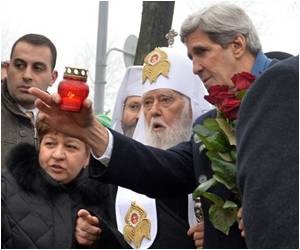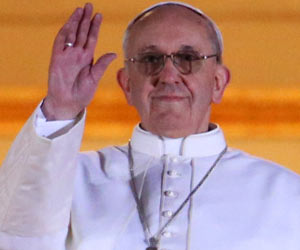Belarussians have never seen such an abundance of gastronomic delights in their isolated ex-Soviet country - famously dubbed Europe's last dictatorship . And they have one man to thank:

"Thank you, Vladimir Putin," said engineer Vladimir Nesterovich as he bought his son a 1.70 euro ($2.20) box of Italian pastries at a supermarket in the capital Minsk.
European imports like Brie or Camembert were previously only available at select gourmet food stores, at prices two to three times higher than in Europe -- an unaffordable treat for most Belarussians.
But when the Russian strongman ordered a ban on EU food imports in August in retaliation for Western sanctions over the Ukraine conflict, suppliers were suddenly forced to redirect imports to Belarus, driving prices down.
While Russian foodies are now forced to tighten their belts and learn to live without Spanish jamon and Italian Parmesan cheese, ordinary Belarussians are eagerly discovering the joys of fine cuisine.
"I had never eaten foreign-made cheeses," university lecturer Alexander Vasilyev told AFP.
Advertisement
Pensioner Andrei Fokin added: "During this season I am buying as many imported vegetables and fruit as I want."
Advertisement
"Peaches and peppers are already sold out," she told AFP on a recent afternoon.
This feast of fine food comes despite exhortations on state-controlled television that Belarussian-made products are best.
Run by authoritarian leader Alexander Lukashenko since 1994, Belarus has been the subject of multiple EU sanctions and made self-reliance a key plank of its government policies.
According to its national programme of food security, domestic products must account for 80 to 85 percent of all food consumed in the country of 9.5 million.
Imports such as saltwater fish account for only around a quarter of foods available in Minsk stores while food in provincial shops is nearly all locally sourced.
If Belarussians, who on average spend more than 40 percent of their household income on food, still have one complaint, it's that prices for EU-produced alcohol are still high.
"It's a shame Putin didn't order an embargo on alcohol too," said Nesterovich.
-'A golden age for exporters' -
As Belarussians lap up foreign-made delicacies, local producers are also eager to cash in on Moscow's confrontation with the West by ramping up exports to Russia.
Last month, local food exports to Russia grew by seven percent, according to the agriculture ministry.
"A golden age has started for Belarussian exporters -- a gold rush," said Fyodor Privalov, head of the Agriculture Centre at the National Academy of Sciences of Belarus. "Such opportunities happen once in 20 to 30 years."
Privalov said Russian companies were eager to buy Belarussian-made products, saying lorries from as far as east of the Ural mountains were queueing up outside local food factories.
Predictably, the reorientation towards Russian markets is putting the squeeze on Belarussian consumers as local produce becomes more expensive or disappears from stores altogether.
The move comes hot on the heels of a swine flu outbreak that forced Belarus to cull 20 percent of its pig population last year, a heavy blow to the industry.
As a result, pork has disappeared from many provincial stores, and meat prices have climbed 32 percent since the start of the year.
Some Belarussians lamented that the quality of local goods had recently gone downhill, blaming the change on exporters turning towards Russia.
Pensioner Leonid Deiko said he could no longer find his favourite kind of milk made by regional producers.
"I think all the good milk is being sent to Russia."
And, he added, he could not care less about the sudden cornucopia of Western food.
"I don't need imported products, I don't even look at them."
Source-AFP















